Affidavit of Payment Samples
-
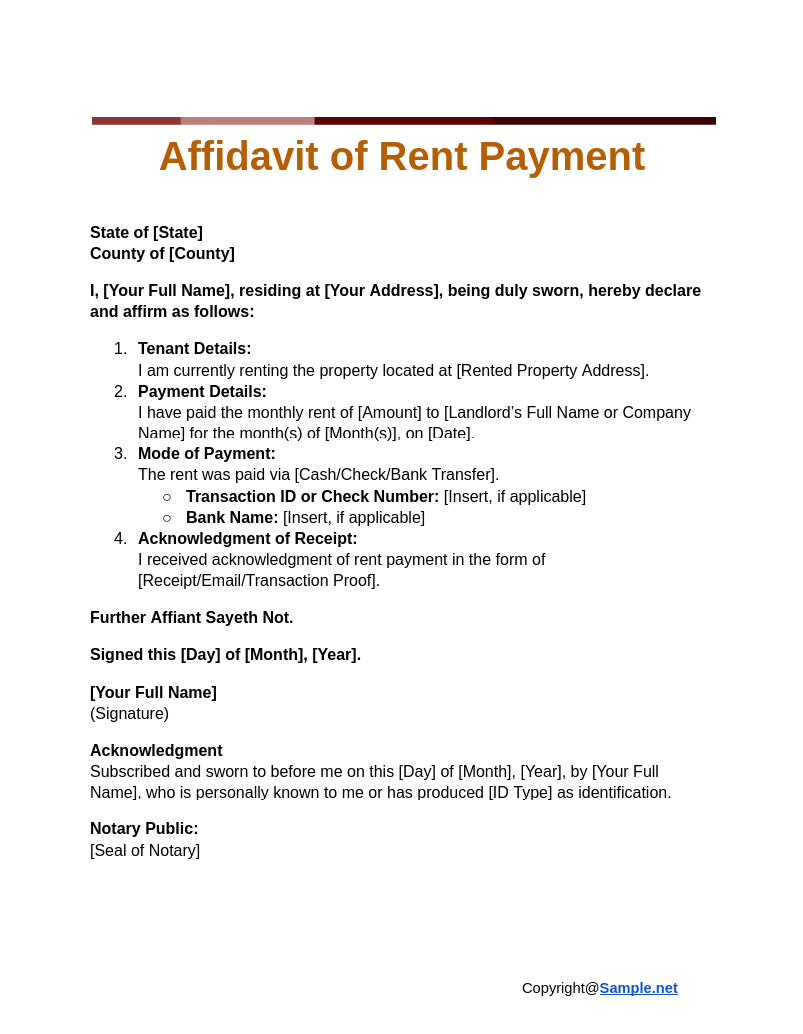
Affidavit of Rent Payment
download now -
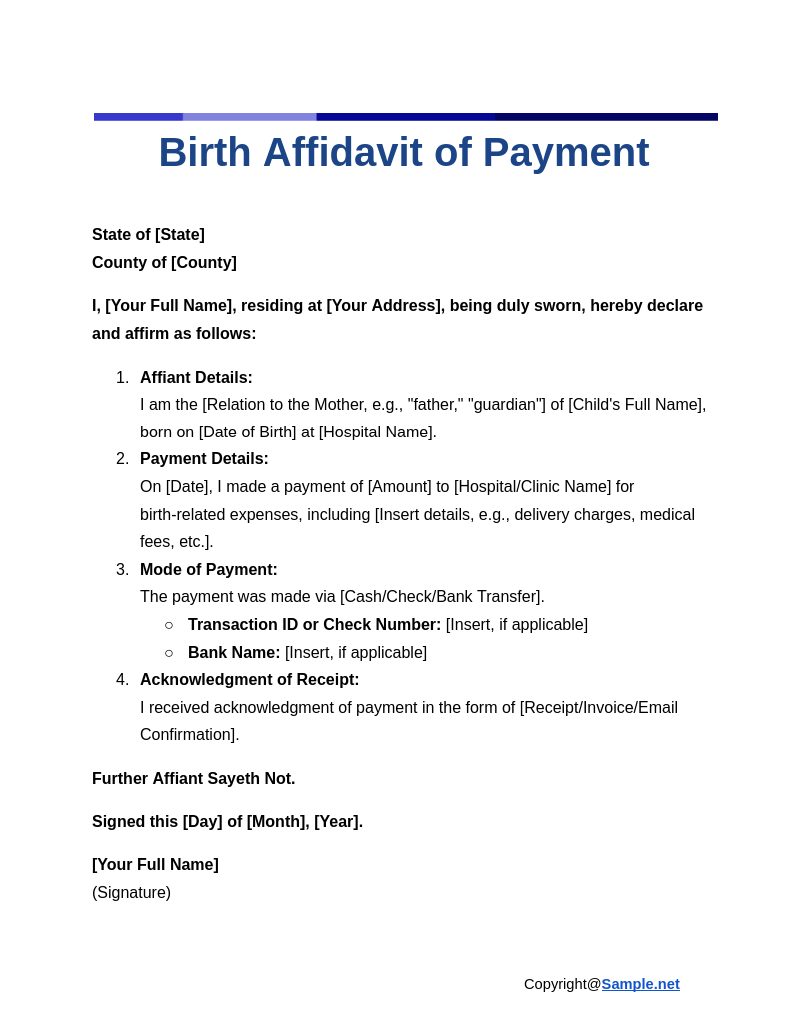
Birth Affidavit of Payment
download now -
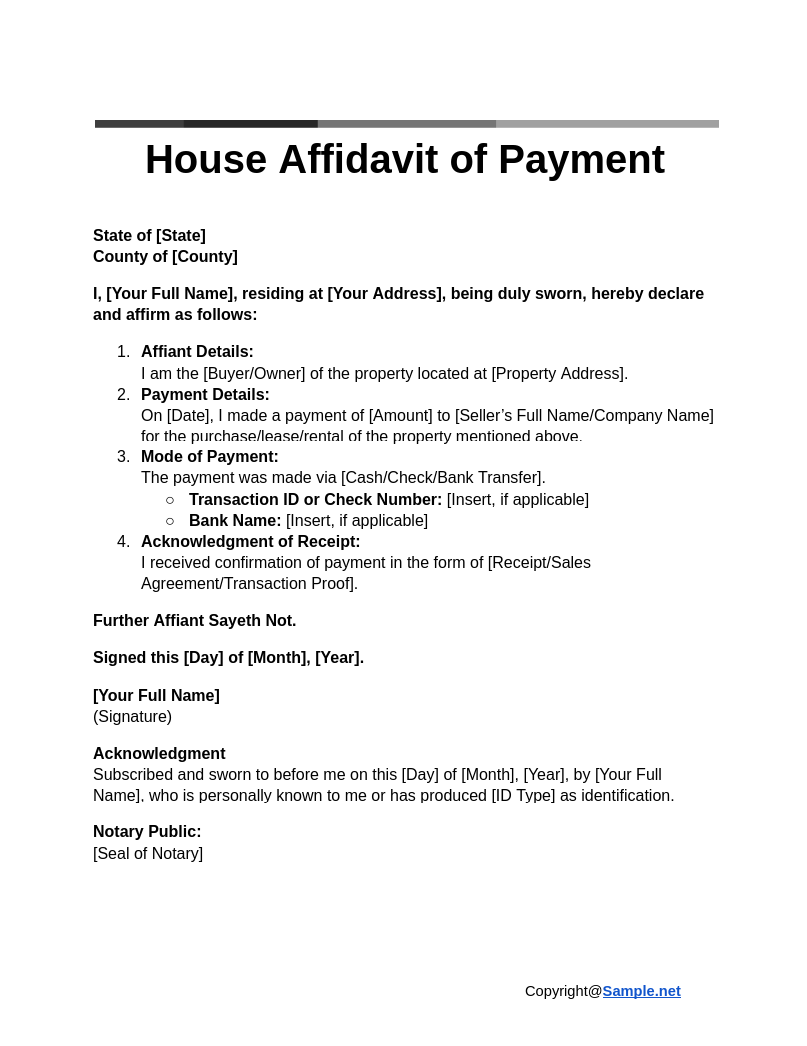
House Affidavit of Payment
download now -
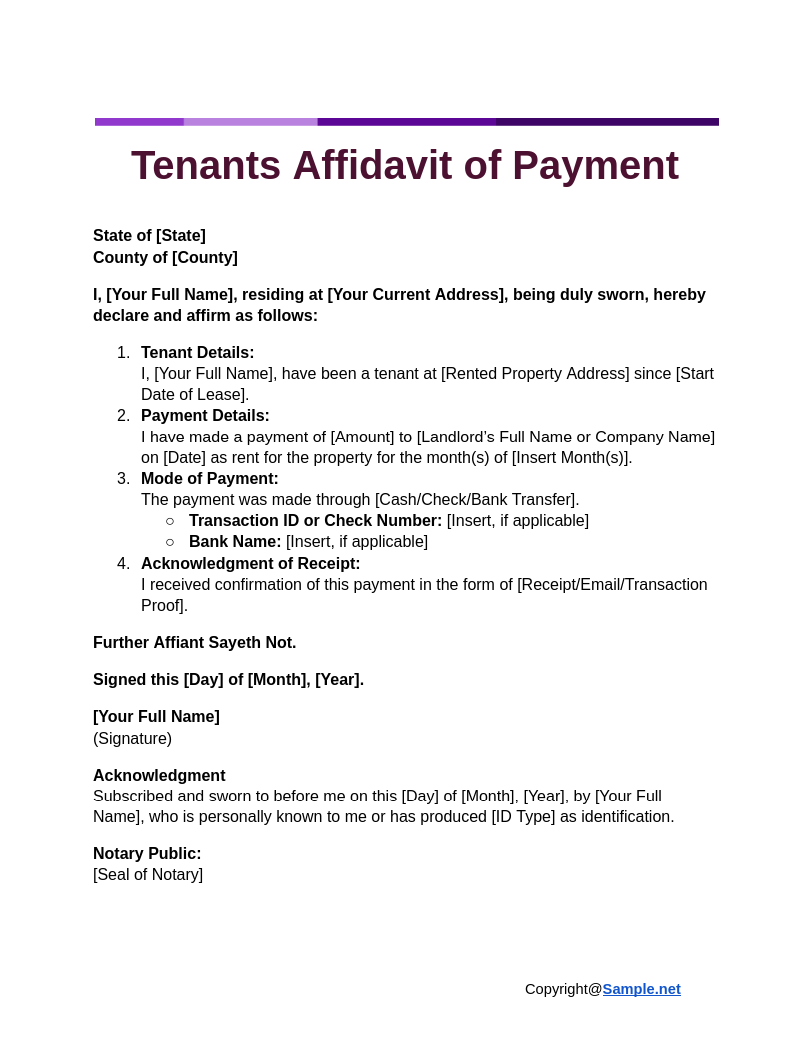
Tenants Affidavit of Payment
download now -
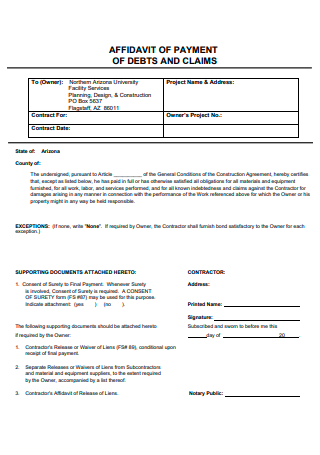
Affidavit of Payment of Debts and Claims
download now -
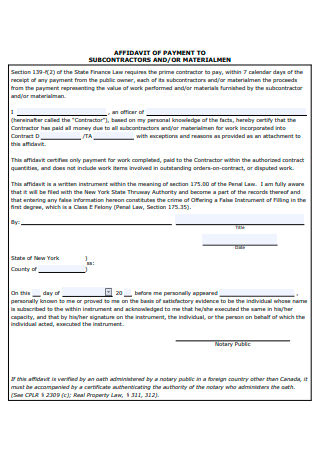
Affidavit of Payment to Subcontractors
download now -
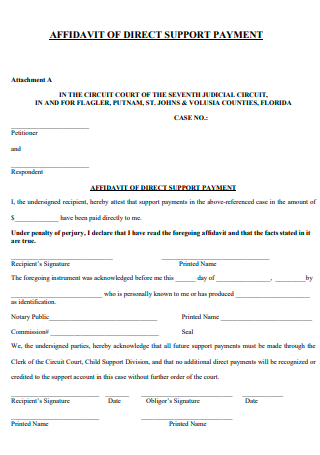
Affidavit of Direct Support Payment
download now -
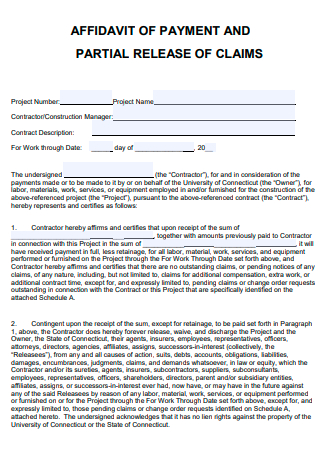
Affidavit of Payment and Partial Release of Claims
download now -
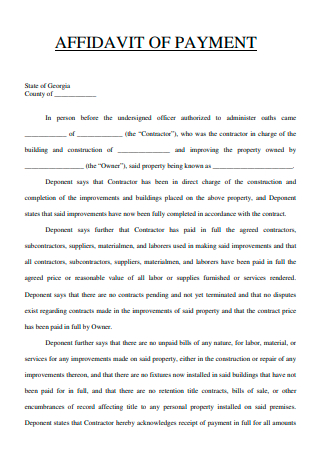
Affidavit of Payment Example
download now -
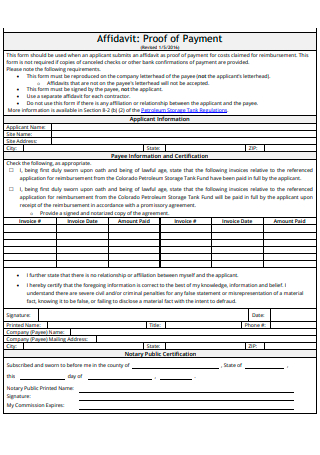
Affidavit Proof of Payment
download now -
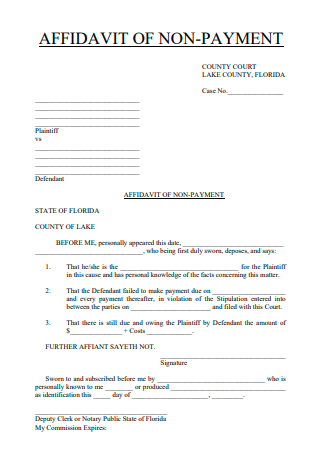
Affidavit of Non-Payment
download now -
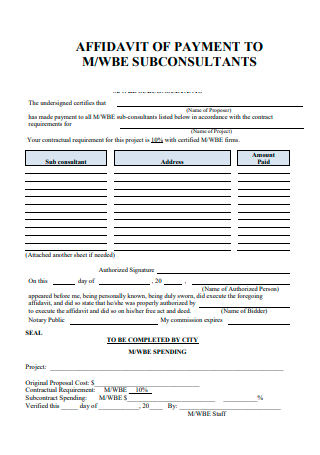
Affidavit of Payment to Sub-Consultants
download now -
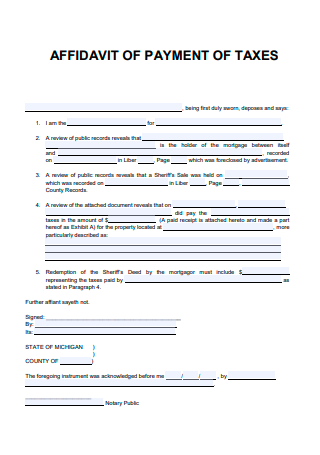
Affidavit of Payment of Taxes
download now -
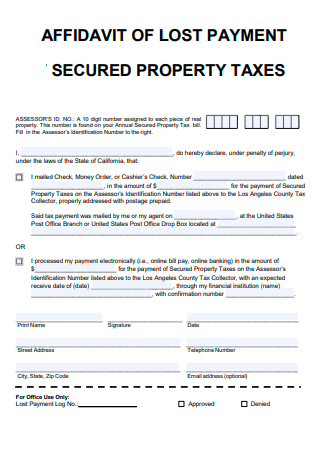
Affidavit of Lost Payment Secured Property Taxes
download now -
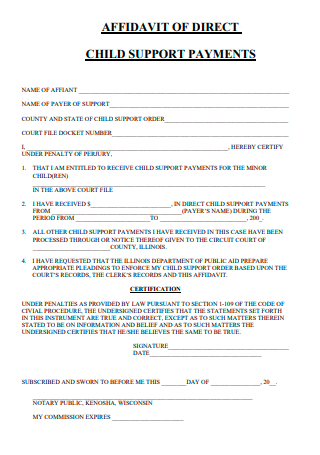
Affidavit of Direct Child Support Payment
download now -
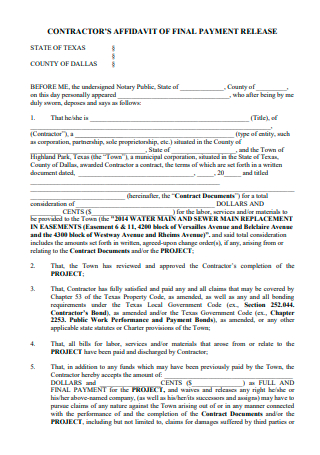
Contractors Affidavit of Final Payment Release
download now -
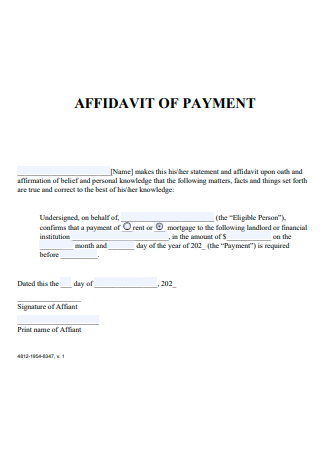
Affidavit of Payment in PDF
download now -
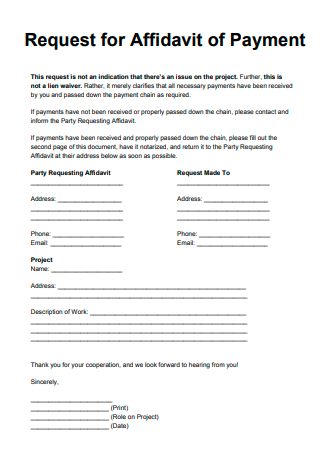
Request For Affidavit of Payment
download now -
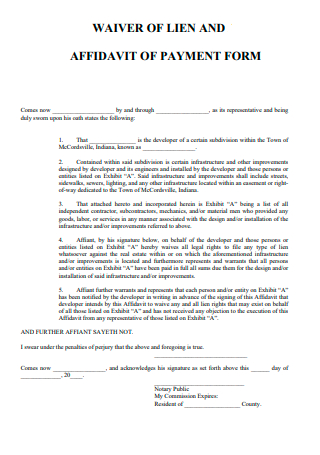
Waiver of Lien and Affidavit of Payment Form
download now -
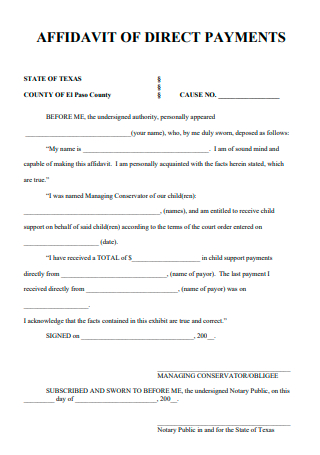
Affidavit of Direct Payment
download now -
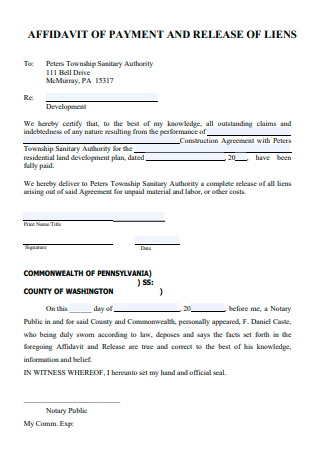
Affidavit of Payment and Release of Liens
download now -
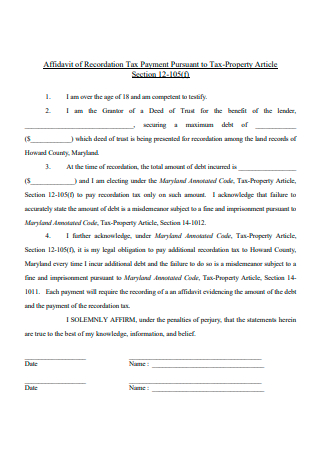
Affidavit of Recordation Tax Payment
download now -
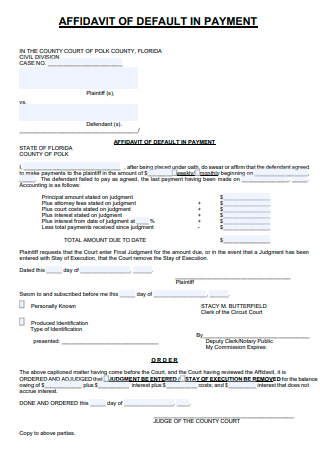
Affidavit of Default in Payment
download now -
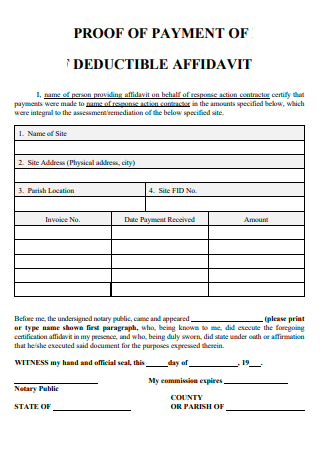
Deductible Affidavit Proof of Payment
download now -
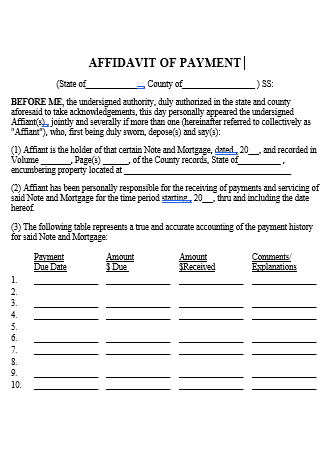
Affidavit of Payment in DOC
download now
FREE Affidavit of Payment s to Download
Affidavit of Payment Format
Affidavit of Payment Samples
What is an Affidavit of Payment?
Purposes of an Affidavit of Payment
How to Write an Affidavit of Payment
FAQs
What are the age restrictions of an affidavit?
When will you need an affidavit?
How long is an affidavit valid for?
What are the risks of not notarizing an Affidavit of Payment?
How does an Affidavit of Payment differ from a receipt?
What happens if there is an error in the Affidavit of Payment?
Is an Affidavit of Payment necessary for small transactions?
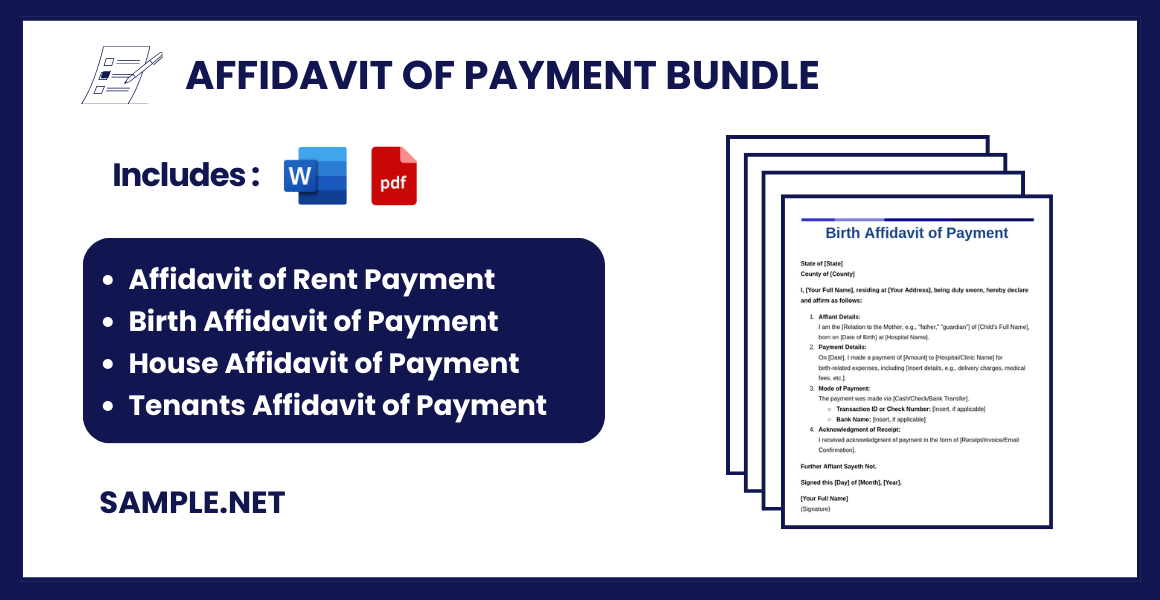
Download Affidavit of Payment Bundle
Affidavit of Payment Format
State of [State]
County of [County]
Before me, the undersigned authority, personally appeared [Your Full Name], who, being duly sworn, deposes and says:
1. Affiant’s Details: I, [Your Full Name], residing at [Your Address], am of legal age and competent to make this affidavit.
2. Payment Details: On [Date], I made a payment in the amount of [Amount] to [Recipient’s Name or Business] for the purpose of [Reason for Payment, e.g., “settling an invoice,” “completing a transaction,” etc.].
3. Mode of Payment: The payment was made via [Specify Method, e.g., “bank transfer,” “check,” “cash,” etc.], with the following details:
- Check Number/Transaction ID: [Insert if applicable]
- Bank Name: [Insert if applicable]
- Payment Reference: [Insert if applicable]
4. Acknowledgment of Receipt: I have received confirmation of the payment, evidenced by [Insert proof, e.g., “receipt,” “email acknowledgment,” “transaction ID,” etc.].
5. Statement of Truth: I affirm that the information provided in this affidavit is true and correct to the best of my knowledge.
Further Affiant Sayeth Not.
Signed this [Day] of [Month], [Year].
[Your Full Name]
(Signature)
Acknowledgment
Subscribed and sworn to before me on this [Day] of [Month], [Year], by [Your Full Name], who is personally known to me or has produced [ID Type] as identification.
[Seal of Notary Public]
Notary Public
[Notary’s Full Name]
Commission Number: [Insert Number]
My Commission Expires: [Insert Date]
What is an Affidavit of Payment?
An Affidavit of payment is a discretionary document, which means it is not required by law. It does, however, serve as verification that the presenting party has been paid in full and that any subcontractors, suppliers, or other parties with whom they engaged have been paid as necessary. As you venture further into the working industry, you will find that payment receipts are of great importance. This is why a contractor’s affidavit of payment is still recommended. Check out the affidavit of payment sample provided in this article so you can have a better idea of how it is composed. You can also see more on Affidavit of Transfer.
Purposes of an Affidavit of Payment
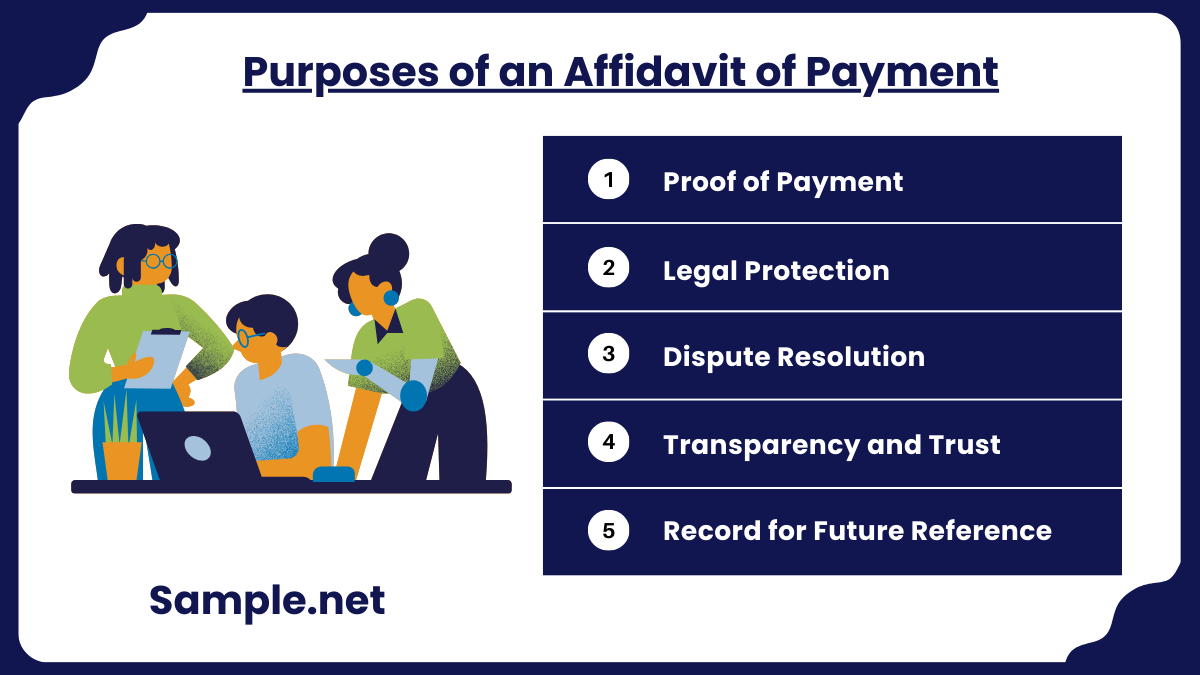
An Affidavit of Payment serves several critical purposes, ensuring clarity, legality, and accountability in financial transactions. Below are its primary uses:
1. Proof of Payment
The affidavit acts as official evidence that a payment has been made, eliminating doubts or disputes regarding the transaction.
2. Legal Protection
By providing a sworn statement, it protects the payer and payee from potential legal challenges or accusations of non-payment.
3. Dispute Resolution
In case of conflicts over payment, the affidavit serves as a legal document that can be presented in court or arbitration.
4. Transparency and Trust
It fosters transparency between the involved parties by formally documenting the terms and conditions of the payment. You can also see more on Company Affidavit.
5. Record for Future Reference
The affidavit provides a detailed record of the payment, useful for audits, financial planning, or future legal proceedings.
How to Write an Affidavit of Payment
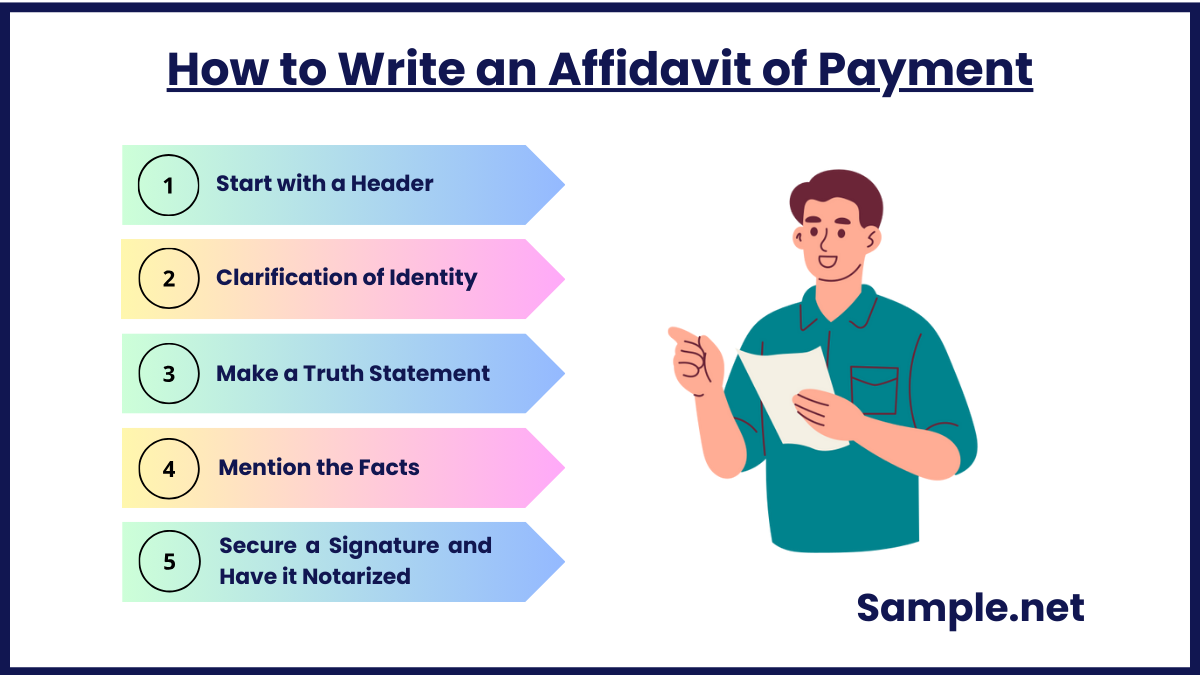
Although affidavits are considered legal papers, they may be written by anybody. The affidavit is legitimate as long as it is properly signed, witnessed, and notarized. This implies you won’t need to hire a lawyer to draft an affidavit for you. It should be noted, however, that certain types of affidavits will require certain information to serve their function and meet Legal criteria. The essential parts listed below should be included. Particularly for this article, you will need to ensure that the affidavit of payment agreement is credible and trustworthy. To avoid a faulty affidavit of payment of debts and claims, thoroughly review this guide. You can also see more on Tenant Affidavit.
1. Start with a Header
If the affidavit is for an active investigation, the heading may be a case heading, or it may just identify the particular document and your name if you do not have an ongoing case. The court where your case is being heard, the case number, and the names of the plaintiffs and defendants are all included in the case header. The county and state where you will sign the affidavit will be mentioned after the case header or general Title. If you are having difficulty, it is best to proceed with caution. Seeking help from a lawyer is advisable.
2. Clarification of Identity
The next portion of your affidavit is referred to as a declaration of identity. This is where you will put your personal information, such as your name, age, occupation, location of residence, and any other relevant information to the issue or case. This part is intended to introduce yourself in connection to the information you are about to present. You don’t have to get carried away, but you must include any material relevant to the allegations you are making. If you were submitting an affidavit establishing an alibi for someone suspected of a crime, your relationship to that person would need to be included in your statement of identification. You can also see more on Affidavit of Personal.
3. Make a Truth Statement
This portion of your affidavit is used to swear that you have spoken the truth to the best of your ability. A statement of truth is the same as swearing under oath in court. Your truth statement must be in the first person, and make sure that you can identify yourself in it. Keep it brief and to the point. You are declaring in your affidavit that you promise not to lie.
4. Mention the Facts
Each fact is split into different paragraphs to provide convenience to the reader, lawyer, or even judge. This section will most likely be the longest piece of the affidavit. There is no set length for this section; all that matters is that it includes all of the necessary information. Your sole responsibility is to state the facts as you recall them. The interpretations should be left to the attorneys. When you present these facts, you must provide specifics such as names, dates, times, and addresses. For this document, you have to ensure you explicitly state your Payment towards the other party. You can also see more on Rental Affidavit.
5. Secure a Signature and Have it Notarized
The last step in finishing your affidavit is to sign it and have it Notarized. You can complete the majority of your affidavit before having it notarized and witness, but you must sign it in the presence of a qualified witness or notary. This section must be finished in the presence of a witness. You will need a piece of official identification to have anything notarized to prove that you are who you say you are. While some jurisdictions provide remote notarization, others require you to have your affidavit notarized in person. You can also see more on Gift Affidavit.
[/ns_row]
FAQs
What are the age restrictions of an affidavit?
There are no age limitations for signing an affidavit. You must, however, be of sound mind and comprehend what you are signing and why you are doing it. Remember that an affidavit must be signed under oath. Unless you are over the age of 18, you will not be asked to sign an affidavit. Minors, on the other hand, may be required to sign an affidavit in a family court proceeding. It is critical, especially when dealing with an affidavit of payment of taxes, but is more common for non-minors. You can also see more on Affidavit of Title.
When will you need an affidavit?
A simple action, such as a legal name change, will need a written declaration from the petitioner to ensure that the request is not being made for illicit reasons or to cheat creditors. Affidavits may be necessary for a variety of legal processes, most notably estate planning and family law concerns. Other legal documents may not be regarded legitimate without these affidavits, or demonstrating their legality would be considerably more difficult. Several sorts of cases necessitate an affidavit, while others may be optional. You can produce your basic affidavit in minutes, with lots of room for customization to meet your specific needs.
How long is an affidavit valid for?
Affidavit of residency, marriage, change of name, heirship, and many more are examples. As a result, these affidavits will not expire since there is no expiration date for affidavits that are properly signed and published with reliable proof. Although an affidavit has no time limit on its validity, some court documents will be valid for 12 months from the day it is signed by the commissioner. It is best advised to check in on your local state or city protocols regarding the longevity of the affidavit or check in on your contacted attorney. You can also see more on Affidavit of Employment.
What are the risks of not notarizing an Affidavit of Payment?
Without notarization, the affidavit might lack credibility in legal settings. Courts may not recognize it as a binding document, reducing its effectiveness in resolving disputes.
How does an Affidavit of Payment differ from a receipt?
While a receipt is a simple acknowledgment of payment, an affidavit is a sworn legal document that carries more weight in disputes or court cases. It is notarized and provides detailed information about the transaction. You can also see more on Affidavit of Funeral Expenses.
What happens if there is an error in the Affidavit of Payment?
Errors can lead to disputes or make the document invalid in legal contexts. Always double-check the information and consult a legal professional if necessary.
Is an Affidavit of Payment necessary for small transactions?
While it is not always required for small transactions, it is advisable when dealing with significant amounts or formal agreements to provide a strong legal record. You can also see more on Affidavit Sample.
